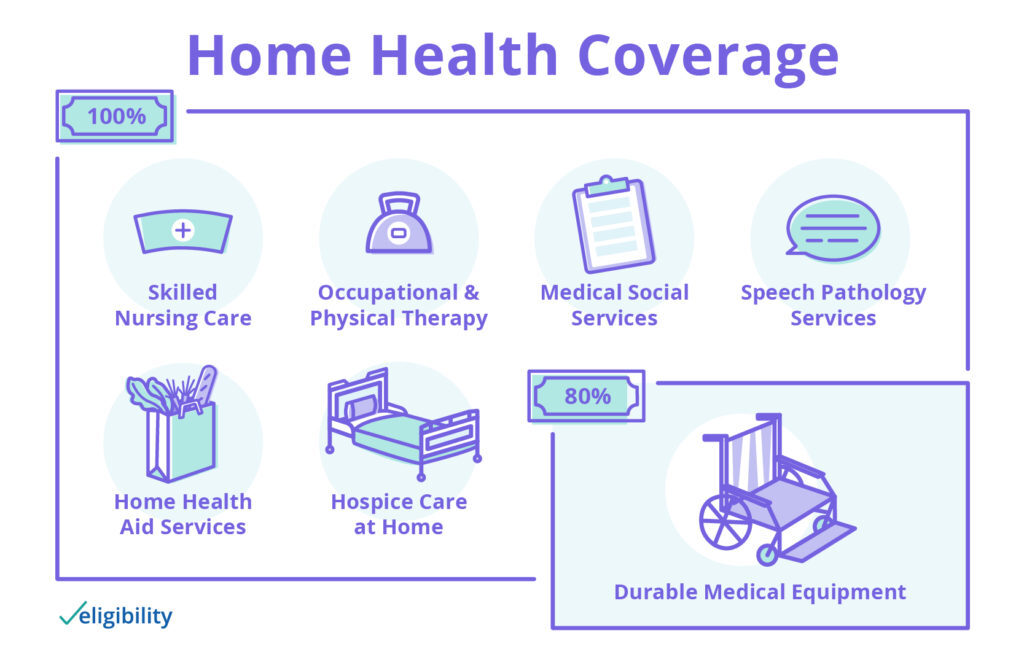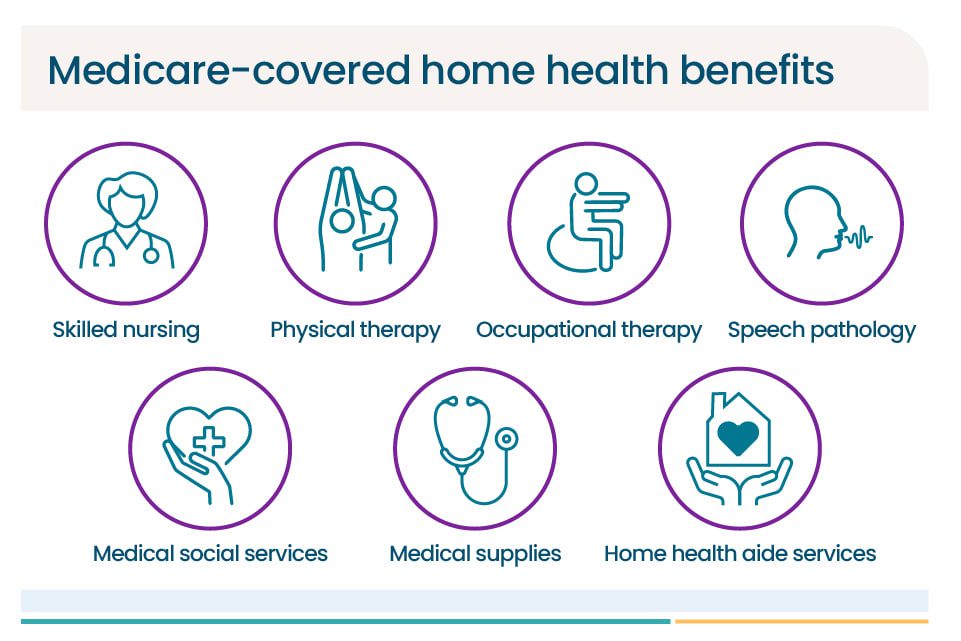To qualify for home health care under Medicare, a patient must be under a doctor’s care and certified as homebound. The doctor must also determine the need for intermittent skilled nursing care, physical therapy, or speech-language pathology services.
Navigating the requirements for Medicare’s coverage of home health care can be daunting, but understanding the essentials helps. Your doctor’s plan of care plays a pivotal role, and the services you need must be those that are only available through a visiting health professional, not self-administered.
Perfect for those recovering from an illness or suffering from a chronic condition, the Medicare home health benefit is a resource that ensures continuity of care within the comfort of one’s home. Tailored to meet the demands of patients who cannot easily leave their houses, this facet of Medicare can be an invaluable support for eligible beneficiaries.

Credit: eligibility.com
How To Qualify For Home Health Care Under Medicare
Qualifying for home health care under Medicare requires a doctor’s certification and a plan of care. Patients must need intermittent skilled nursing services, therapy, or continued occupational services.
Understanding the steps to become eligible for home health care covered by Medicare is crucial if you or a loved one requires medical assistance at home. Grasping Medicare’s specific eligibility criteria can ensure that you receive the necessary care without undue financial burden.
Eligibility Requirements For Medicare Home Health Care
To qualify for home health care under Medicare, a set of stipulated criteria must be met:
- Doctor’s order: Your doctor must prescribe home health care as a necessary part of your treatment plan.
- Medical necessity: You require intermittent skilled nursing care, physical therapy, speech-language pathology services, or continued occupational therapy.
- Homebound status: It is required that you are homebound, meaning it is extremely challenging for you to leave your home and you need help doing so.
- Medicare-approved agency: The home health agency providing your care must be Medicare-certified.
What Services Does Medicare Cover For Home Health Care?
Medicare covers a comprehensive range of services for eligible individuals, tailored to meet their specific health needs:
- Skilled nursing services: They’re provided on a part-time or intermittent basis for the treatment of an illness or injury.
- Therapeutic services: Physical, occupational, and speech-language therapy services are included if they are expected to improve your condition.
- Medical social services: These services address social and emotional concerns related to your illness or recovery.
- Home health aide services: Limited personal care assistance is provided if you’re also receiving skilled services.
What Isn’t Covered By Medicare?
While Medicare provides coverage for many aspects of home health care, there are specific exclusions to be aware of:
- 24-hour care: Medicare does not cover round-the-clock home health care.
- Personal care services: If you only need assistance with personal care and no skilled services, Medicare will not cover these services.
- Meal delivery: Medicare does not cover meal delivery services to your home.
- Homemaker services: General housekeeping and maintenance services are not covered.
How To Start The Process For Medicare Home Health Care
Initiating home health care under Medicare involves a few key steps:
- Consult your doctor: Discuss with your physician about your health concerns and the need for home health care.
- Obtain a prescription: Your doctor must prescribe home health care services as part of your care plan.
- Choose an agency: Select a Medicare-certified home health agency to provide your care.
- Understand your plan of care: Your doctor and home health agency will craft a detailed care plan that outlines your health services.
How To Qualify For Home Health Care Under Medicare For Seniors
To qualify for home health care under Medicare, seniors must meet certain criteria set by Medicare, including doctor certification of necessity and a plan of care. Eligibility hinges on the senior’s need for skilled nursing care or therapy services on a part-time basis.
Navigating the waters of healthcare coverage can be daunting, especially for seniors seeking home health care through Medicare. Recognizing whether you or your loved one qualifies demands an understanding of the specific criteria set by Medicare. Let’s dive into what it takes for seniors to be eligible for this vital service.
Medicare’s Eligibility Requirements For Home Health Care
To qualify for home health care under Medicare, seniors must meet several conditions that confirm their need for at-home services.
- Doctor’s orders: The senior must have a doctor’s certification indicating that medical care at home is necessary.
- Face-to-face encounter: This involves the doctor meeting with the patient to ascertain the need for home health services, typically within 120 days before or 30 days after the start of home care.
- Intermittent skilled nursing care or therapy needs: The patient requires part-time nursing care or specific therapeutic services like physical therapy, speech-language pathology, or continued occupational therapy.
- Being homebound: The senior must be unable to leave home without considerable effort and assistance, essentially confined to the home environment.
- Medicare-approved agency: The home health care must be provided by a Medicare-certified home health agency to ensure that standards are met.
The Process Of Applying For Medicare Home Health Care
Once eligibility is determined, seniors must follow a specific process to apply for home health care.
Navigating through the application process is a crucial step. The path involves several significant players, from health care providers to Medicare itself. Here’s what you need to know:
- Consultation with a primary physician: The journey begins with your doctor, who will assess your health needs and establish a care plan.
- Choosing an agency: Select a Medicare-certified home health agency to deliver the healthcare services as prescribed in the care plan.
- Coordination of services: The home health agency coordinates with the doctor to start services. This partnership is important for the continuity and effectiveness of the care.
Understanding these steps helps in streamlining the process, making it less overwhelming for seniors and their families. Qualifying for home health care under Medicare is a combination of meeting stringent criteria and following a defined pathway to application. Empowering yourself with this knowledge can lead to better health outcomes and the comfort of receiving care within the familiar surroundings of your home.

Credit: www.elderneedslaw.com
Frequently Asked Questions Of How To Qualify For Home Health Care Under Medicare
Does Medicare Pay For Home Assistant?
Medicare typically covers home health care services if prescribed by a doctor and provided by Medicare-certified agencies. It does not cover full-time home care assistants for personal care or daily activities.
What Is The Most Common Diagnosis For Home Health Care?
The most common diagnosis for home health care is chronic conditions, such as heart disease, diabetes, and COPD.
What Criteria Does An Individual Have To Meet In Order To Receive Medicare For Home Health Services?
To qualify for Medicare home health services, an individual must be under a doctor’s care, require either intermittent skilled nursing care, physical therapy, speech-language pathology, or continued occupational therapy, be homebound, and have a plan of care certified by a doctor.
Which Type Of Care Is Not Covered By Medicare?
Medicare generally does not cover long-term care, most dental care, eye exams for prescription glasses, dentures, cosmetic surgery, acupuncture, or hearing aids and exams for fitting them.
Conclusion
Navigating the requirements for Medicare’s home health care can seem daunting. By meeting the eligibility criteria and having doctor certification, you can access indispensable services. Always consult with healthcare professionals to understand your benefits. Remember, proper qualification ensures the support you need is within reach.
Empower yourself with knowledge, and take the next step towards comprehensive in-home care.









